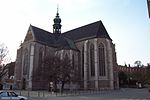Anthropos Pavilion
History museums in the Czech RepublicMuseums in BrnoNatural history museums

Anthropos (or Anthropos Pavilion, from the Greek Άνθρωπος, human or man) is a museum located in the city of Brno, South Moravia, Czech Republic. The museum is a part of the Moravské zemské muzeum (Moravian Museum). It focuses on exhibitions presenting the oldest history of Europe and mankind. In a 2009 exhibition, the museum presented the most important art works of the Paleolithic era, such as Venus of Willendorf (exhibited for the first time outside of Austria) and Venus of Dolní Věstonice.
Excerpt from the Wikipedia article Anthropos Pavilion (License: CC BY-SA 3.0, Authors, Images).Anthropos Pavilion
Pisárecká, Brno Pisárky
Geographical coordinates (GPS) Address Nearby Places Show on map
Geographical coordinates (GPS)
| Latitude | Longitude |
|---|---|
| N 49.191944444444 ° | E 16.566944444444 ° |
Address
Pisárecká 273/5
603 00 Brno, Pisárky
Czechia
Open on Google Maps











